NATO is facing possibly the greatest military challenge to European security order since its inception as a Russian invasion of Ukraine, according to U.S. President Joe Biden, “remains distinctly possible.” The United States and many other NATO member state governments, including Turkey, have warned their nationals to leave Ukraine. Looming large is the question of where Ankara stands in this crisis? Could the Russia-Ukraine crisis have the silver lining of re-anchoring Turkey in NATO — which it joined 70 years ago this week — in a manner that benefits Turkish, Ukrainian, and wider European security?
Turkey, the West, and NATO
The crisis over Ukraine has reignited the geopolitical relevance of Turkey and NATO for each other. In recent years Western skepticism about Turkey’s NATO membership and reliability had grown significantly. There have been multiple reasons for this. NATO has been a target of constant populist abuse in Turkey. In the aftermath of the coup attempt in 2016, deputies from the ruling Justice and Development Party (AKP) alleged NATO involvement, without presenting a shred of evidence, and even called it a “terror organization.” This allegation has been periodically nurtured by the government and most recently by a member of President Recep Tayyip Erdoğan’s cabinet. Damage was also done by Ankara’s decision to purchase S-400 missiles from Russia, and a relentless diplomatic battle over them saw Turkey sanctioned by the United States and thrown out of the F-35 program. Turkish experts remain puzzled over the rationale behind the decision. Erdoğan’s threat to expel 10 Western ambassadors, seven of them from NATO allies, for criticizing the indefinite detention of philanthropist Osman Kavala fueled further skepticism about Turkey’s place in the alliance.
Yet, below the radar, throughout this period Turkey has been a regular contributor to NATO missions. In Afghanistan it performed a wide range of tasks from providing security for Kabul’s airport to leading a Provincial Reconstruction Team in Wardak province. During 2021 Turkey led NATO’s Very High Readiness Joint Task Force, placing thousands of its soldiers on standby ready to deploy within days for allied missions. Simultaneously it continued to participate with F-16s in the Baltic and Poland air policing missions and fulfilled NATO air surveillance tasks. With the Russian annexation of Crimea threatening to dramatically alter the military balance in the Black Sea, Turkey stepped up its efforts to support allied cooperation in the region. Turkish naval and air force assets regularly participate in exercises, such as the U.S. and Ukraine-hosted Sea Breeze, and patrol missions with units from NATO member countries. Lastly, independently of the state of its relations with the Soviet Union and later Russia, Turkey has persistently supported NATO’s enlargement including the “open door” policy.
Can Turkey help Ukraine?
Ideally, Turkey would want to continue selling arms to, deepen its defense cooperation with, and expand its exports to Ukraine, now that a free trade agreement has just been signed. But a Russian invasion of Ukraine would leave Turkey’s hands badly tied as it would spell more economic turbulence and a reluctance to support a U.S.-led sanctions policy. The Turkish economy is in its worse state in decades, without any immediate signs of a recovery, while Turkey is dependent on Russia in many realms, from energy supplies to tourist income to Moscow’s acquiescence to Ankara’s military presence in northern Syria. Furthermore, in the light of reports of six Russian warships sailing into the Black Sea, it is also doubtful Turkey can afford to use its discretionary authority under Article 21 of the 1936 Montreux Convention and close the Turkish Straits to Russian warships engaged in hostilities. Turkey is unlikely to risk a costly situation reminiscent of the one caused by the sanctions Russia imposed on Turkey following the downing of a Russian warplane in 2015.
The issue is not so much Turkey’s dependence on Russia per se but the fact that Ankara is not much more actively engaged in Western efforts to deter Moscow and resolve the current crisis. Erdoğan, in spite of his unequivocal support for Ukraine’s territorial integrity as well as enthusiasm for finding a negotiated solution to the crisis, is conspicuously absent from the high-level diplomatic efforts to coordinate a unified trans-Atlantic response, while Biden does not appear to consider Turkey as a core ally. Contacts have been limited to polite telephone calls between Secretary of State Antony Blinken and Turkish Foreign Minister Mevlüt Çavuşoğlu, and national security adviser Jake Sullivan and Erdoğan’s advisor İbrahim Kalın.
The problem lies in Turkey’s broader drift away from the West and the dramatic rise in the authoritarianism of its governance, taking Turkey well away from the shared democratic values which are supposed to bond NATO members. The most recent manifestation of this occurred when Erdoğan categorically dismissed the decision of the Council of Europe to initiate disciplinary action against Turkey for failing to abide by a European Court of Human Rights (ECHR) ruling calling for Kavala’s release. It was especially ironic that this occurred just as Erdoğan was leaving for a visit to Ukraine, a country which has risked — and experienced — war to be able to join the West and sustain a democratic way of life. Membership in the council, since its inception in 1949, and commitment to abide with by ECHR rulings had long been regarded as an affirmation of Turkey’s Western vocation.
This picture is exacerbated by negative public opinion towards Europe and the United States. Years of incessant anti-Western and anti-American narrative and populist claims that the West is trying to undermine Turkey’s global power aspirations has profoundly shaped public attitudes. The absence of a free and critical media prevents the public from arriving at a more balanced and realistic opinion about Turkey and the West. According to Metropoll, a public opinion research company, 39.4% of respondents preferred closer relations with China and Russia (the East) over 37.5% preferring closer relations with the European Union and U.S. (the West) in January 2022, compared to 27.6% to 40.9% respectively a year earlier. The fact that this swing occurred at a time when Russia is openly threatening Ukraine with invasion is particularly striking, as the inviolability of territorial integrity and sovereignty is held in high regard in Turkey. Furthermore, the Turkish public perceives a greater security threat from the United States than it does from Russia (see slides 81-83).
A foreign policy at loggerheads with the West and, until very recently, confrontationist towards a wide range of countries in its neighborhood has fueled an image of a Turkey that “has lost its sense of direction and belonging.” Hence, it is not surprising that many ask whether Turkey “is still a member of the Western community of nations” and “among the committed members of NATO?” Such doubts inhibit Turkey from playing a fully-fledged role in deterring Russia from invading Ukraine.
Moving forward
However, all is not lost. The Ukrainian crisis has increasing questions about the wisdom of Turkey’s cozy relationship with Russia and a greater appreciation of NATO’s value, recently reiterated by two prominent retired Turkish ambassadors. Interestingly, their reasoning is not that different than the Turkish diplomats and ministers of foreign affairs from the 1940s and 1950s who played a central role in negotiating Turkey’s entry into NATO, revealing the continuity that comes with geography but also the persistent commitment to a Western vocation dating from Ottoman times.
Moving forward, revitalizing Turkey’s traditional Western vocation and its NATO membership will be dependent on two developments. Erdoğan is failing to address Turkey’s mounting problems. His approval ratings have dropped from almost 56% at the start of the COVID-19 pandemic to 38.6% at the end of 2021, while the governing AKP has also steadily lost support and was down to 23.9%. Under these circumstances, the opposition stands a growing chance of winning the next elections if they are reasonably free. However, the opposition led by the social democratic People’s Republican Party (CHP) has remained by and large quiet on foreign policy issues and shied from advocating pro-Western policies. This would need to change, and the opposition would need to adopt an informed and rational platform that dispels prejudices and better explains to the public why revitalizing stronger relations with the West would benefit Turkey’s interests.
The West needs to do its part too. Foremost, there needs to be a recognition that there is political change in the offing in Turkey. It is far from certain but there is a decent likelihood that the next elections would be won by the opposition. In the meantime, it will be important for the U.S. to recognize that the current crisis over Ukraine has once more shown the strategic value of Turkey to NATO and develop, together with other allies, a constructive narrative that would welcome a post-election Turkey back into the core of the trans-Atlantic alliance. Given the stalling out of its enlargement process, the EU is unlikely to be able to play the robust role it did in reforming Turkish democracy in the 2000s. But just like 70 years ago, Turkey’s NATO membership could become a conduit for mutually reinforcing Turkey’s Western vocation and its democracy while benefiting European security, including that of Ukraine.
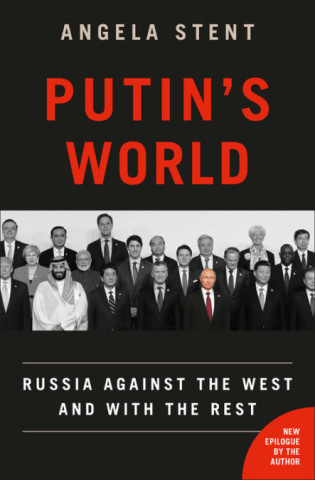
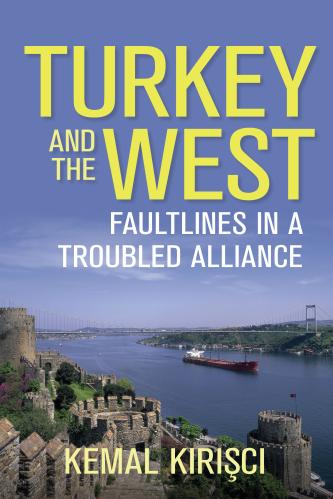
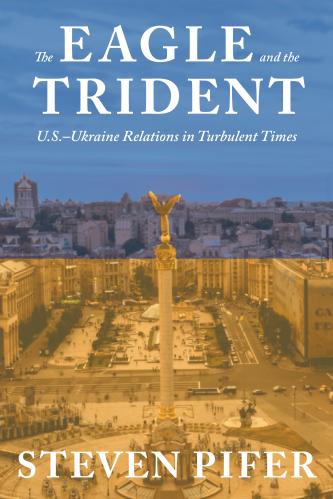
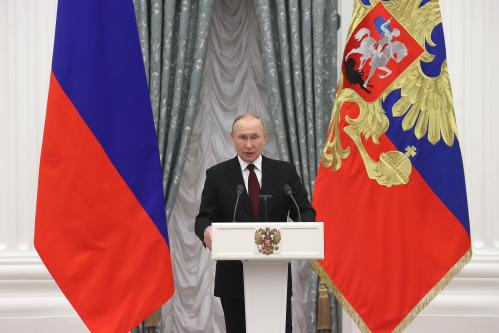
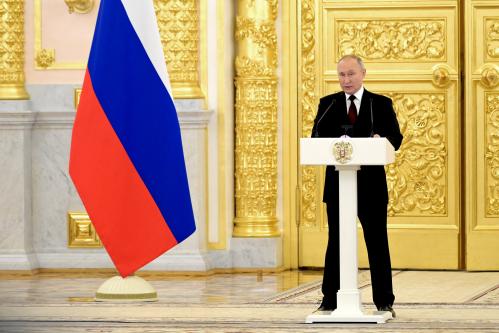
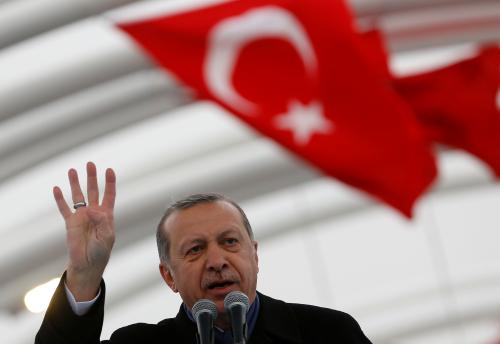


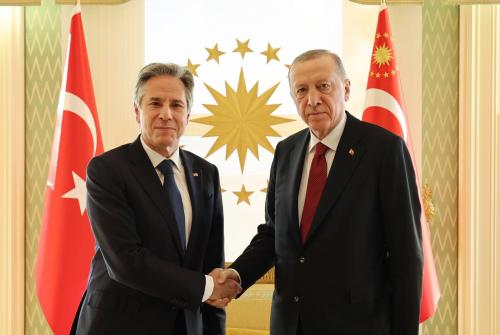
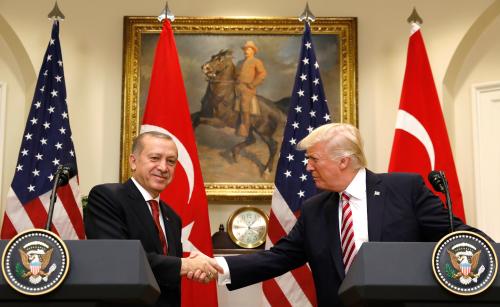
Commentary
Can the Russia-Ukraine crisis offer an opportunity to re-anchor Turkey in NATO?
February 16, 2022